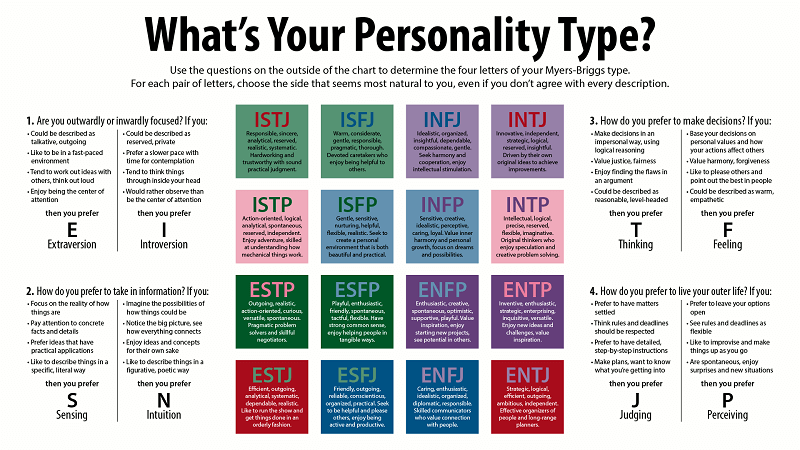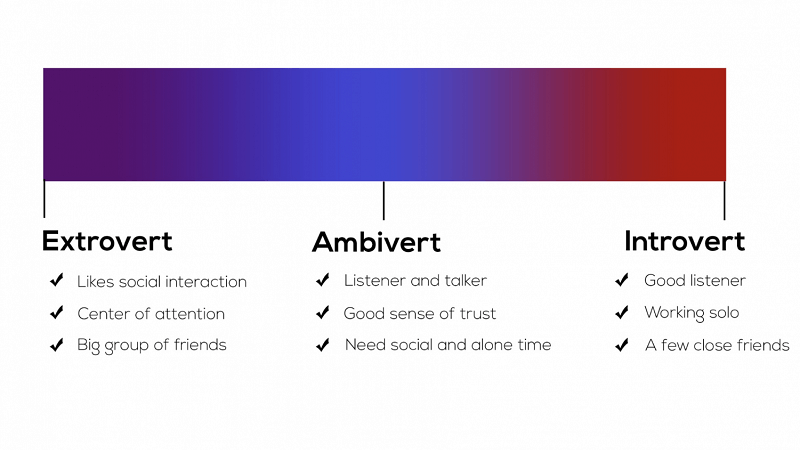Content
When you hire new employees, as a recruiter, you already have the hiring profiles, the interview questions, and a good idea of what candidate you are looking for in a particular position. Most likely, you will use pre-employment personality tests to evaluate the applicants besides the cognitive skills testing tools. Today, we will talk about the introvert extrovert test as a predictor of job performance. We will also discuss using an introvert vs. extrovert test correctly to hire for talent and growth, not exclusively for personality traits. Let’s see today what recruiters need to know about introversion, extroversion, and pre-employment personality tests!
Is the Introvert Extrovert Test a Predictor for Job Performance?
Psychologist Carl Jung was the first one to describe two opposing personalities: introverts vs. extroverts. This definitive division, however, did not please him entirely. He admitted that a person couldn’t be a pure introvert or a pure extrovert; otherwise, individuals would have to spend their lives in a “madhouse.”
Modern psychology and neurosciences shone plenty of light on many psychological theories of old, validating, invalidating, or correcting them. When it comes to introverts vs. extroverts, we cannot use this split-up categorization anymore.
We now know that each individual is most likely an ambivert. Introversion and extroversion are spectrums. In other words, most people lean more significantly towards one side or the other, featuring traits from both.
Introvert Extrovert Tests for Employment – The Double Bladed Sword
The use of personality testing for recruitment dates back to World War I, so we are not discussing the validity of such an approach, as experts established it without a doubt decades ago. As psychological sciences advance, so do personality tests.
We use more than just an introvert extrovert quiz to understand how candidates situate on the spectrum in our modern times. HR experts and responsible companies leave such testing on the Internet for people to have fun with and maybe learn something new about themselves.
A professional, valid recruiting process means – or should mean – combining various personality tests, cognitive skills tests, behavioral interviews, and open discussions with the candidate to extract relevant information to predict job performance.
Overall, we cannot emphasize enough that employability skills represent a mix of soft skills, hard skills, and personality traits. Introversion or extraversion is just the tip of the iceberg.
The Issue with the Polarizing Approach in Introvert Extrovert Testing
Employing just a single personality test for hiring – mostly an introvert vs. extrovert test – can backfire in the long term to the detriment of the employee and the company altogether. As is our culture, most organizations want extroverts in their teams.
An extrovert personality trait defines a person who:
- functions best in social interactions,
- displays high levels of energy,
- loves crowds,
- is gregarious, friendly, and assertive,
- does not step away from a good challenge,
- and makes a desirable leader.
You might feel comfortable and justified in your decision to hire an extrovert for positions in sales, public relations, marketing, human resources, project management, law, medicine, public functions, etc.
On the other hand, pop psychology taught us that introverts:
- do not fare well at all in social contexts,
- avoid crowds,
- like to keep it to themselves,
- work alone,
- take time to complete thorough thought processes,
- stay calm and self-aware,
- enjoy solitude,
- are hard to know,
- are less communicative,
- and even display social anxiety in a wide variety of contexts and social interactions.
In other words, you may feel justified to focus on the introvert extrovert test’s results when you recruit for jobs in accounting, computer programming, science, research & development, data analysis, engineering, tech innovation, and so on.
Imagine Mars Colonization Is In Your Hands
The double-bladed sword cuts deep when you realize that, based on the definitive introvert/extrovert division, you would have never hired former POTUS Barack Obama for one of the most demanding jobs in the world. You would probably never have offered Oscar winner Julia Roberts an acting job either. Nevertheless, both Barack Obama and Julia Roberts are famous introverts, while legendary inventor Benjamin Franklin was a by-the-book extrovert.
To offer a further example, let’s consider hiring candidates to send them on a mission to Mars. Would you suggest introverts or extroverts? According to NASA, putting extroverts in small teams having to share confined spaces is not desirable. Why? Because extroverts, as open, energetic, talkative, and proactive as they are, can become genuinely terrible nuisances for others.
The Other Cons of Using a Focused Introvert Extrovert Test for Hiring
In clinical psychology practice, organizational psychology, and effective recruiting practices, no responsible expert would use a single introvert extrovert test to hire someone. As we all know, pre-employment personality evaluation tools contain multiple types of tests.
So why do we still insist on finding out whether a person is an introvert or an extrovert? It matters to the employer because organizations put most of their money on teamwork. But does a pre-employment introvert extrovert test lead to accurate results? Experts say that they do not. Here is why:
- Such tests are not foolproof. While they can detect a candidate’s spectrum side, it cannot predict sufficiently how the candidate will act and perform in a particular job position. For instance, both introverts and extroverts work in sales, public relations, management, etc. Some even become presidents. Is their introversion/extroversion a predictor of how good a customer service agent, PR specialist, or CEO they will be? No.
- Some experts consider that using only pre-employment personality assessments is an incomplete procedure because you do not consider peoples’ skills. An introvert can rock a sales job just because she/he can listen better to clients. An extrovert may be the perfect fit for your R&D department as she/he pushes everyone into brainstorming, collaboration, competition, challenge, teamwork.
- People are smart and lie. When they get ready for the recruitment process, candidates do their homework sometimes better than the recruiter does. They know the questions and prepare the answers. Most of them have filled in questionnaires and tests before. They understand what headhunters expect and wish to hear. Personality assessments are not easy to cheat, but they are not foolproof either.
You Hired Introverts or Extroverts. What Do You Do with Them?
One drawback of relying solely on an introvert extrovert test in your recruiting process is that you only gain insight on a fraction of what constitutes human personality. On the other hand, we have a general idea that people’s characters are stable in time and only change under extraordinary circumstances.
So what do companies do with introverts and extroverts after they hire them? The chances are that most organizations will typecast their employees, wrongfully assuming that people don’t usually outgrow their personality traits.
How does this affect you as a recruiter?
- If you are a headhunter offering recruiting services to business clients, you may have sent the wrong person for the job.
- If you work in the company’s human resources department, you will have many troubles with onboarding the new employees, and especially with retaining them.
According to Neel Doshi – coauthor of the book Primed to Perform. How to Build the Highest Performing Cultures Through the Science of Motivation – the greatest danger of personality assessments’ results is that they can be destructive in an employers’ hands.
Based on the test outcome of a person being “more introvert” or “more extrovert,” companies can stunt an employee’s development. When organizations use the results to justify a worker’s performance (or lack thereof), promotions, task assignments, new leading positions, etc., the introvert extrovert test becomes a weapon. In turn, this
discourages a “growth” mindset among employees and implicitly encourages blame, leading to a toxic workplace environment. It can discourage employees from trying to improve and grow, and send a message that their “ability” to do something is static – rather than something they can hone over time.
A Few Words on the Power of Introverts
It is common practice for companies to look actively for people who are “outgoing, energetic, team players, open to communication, active, and motivated.” It is how most job offerings sound. Nobody wants an employee who doesn’t play well with others. Nobody wants a lone wolf working alone in a corner, not talking to anyone.
But maybe you want lone wolves. It is perhaps time for introverts to shine, as the new trends in the workforce market show that independent remote working is here to stay, albeit not lacking concern points for the economy and the way we recruit employees as a whole.
Nobody discusses our culture’s preference for extroverts and the stigmatization of introverts in life and at the workplace better than Susan Cain. The author of Quiet: The Power of Introverts in a World That Can’t Stop Talking gave a legendary TED Talk that all recruiters, CEOs, and people who feel less-than because they incline towards the introversion side of the spectrum should watch.
Susan Cain promotes a shift in perspective: why don’t we foster quieter, more contemplative, calmer, and more self-aware organizational environments? Why aren’t we more welcoming towards top performers who do their best work when others leave them be?
A Short Conclusion
To answer the question that we asked at the beginning of this article, an introvert extrovert test alone is not a predictor of job performance. It is a poor predictor of personality because personality itself is a too complex maze of traits, behaviors, abilities, attitudes, and temperaments.
If you are testing for employability skills, you cannot split people into two sides: introverts and extroverts. This splitting alone is a fertile ground for discrimination, stereotypes, and plenty of missed opportunities, not to mention employee turnover’s likeliness.
Moreover, going to extremes is wrong, and history proved it too many times to count. So, instead of hiring and nurturing only extroverts or only introverts, why don’t we hire ambiverts? Why don’t we try to find the balance?
How Do You Use Advantageously an Introvert Extrovert Test when You Assess Personality?

Luckily for the recruiting process and candidates, no professional HR service or department will use only personality assessments, although it was a huge trend back in the day. What we use are several personality tests and different interview types. So let’s take a moment to refresh our knowledge on this subject!
1. The DISC Personality Test
An instrument widely used in recruiting, the DISC identifies four personality profiles:
- dominance (D),
- influence (I),
- steadiness (S),
- and conscientiousness (C).
According to research, most individuals can define themselves on one or two of these dimensions, as their traits describe them the best.
2. The Big 5 Personality Test
The Big 5 test scores candidates’ traits using a sliding scale or a continuum. Once they take the test, candidates’ results can fall anywhere on each measured trait continuum. The Big 5 test evaluates an individual on the following five personality dimensions:
- extroversion,
- agreeableness,
- openness,
- conscientiousness,
- and neuroticism.
It is one of the most popular personality tests used in recruiting – although many argue its validity outside academic research.
3. The Meyer-Briggs Test
This personality test consists of an introspective self-report questionnaire that the candidate fills in. The test evaluates an individual on sixteen personality traits/qualities assigned to four personality dimensions:
- Introversion/Extroversion,
- Sensing/Intuition,
- Thinking/Feeling,
- and Judging/Perceiving.
The theory is that people show a specific inclination towards each trait, revealing how they perceive themselves and the world and how they prefer making decisions.
A Note to Personality Traits Fans
Putting labels on people never lead to anything good. Therefore, critics of “personality types” assessments argue that testing individuals on strict, “core” personality types and traits – such as introvert/extrovert, artistic/practical, organized/spontaneous – contradict the fact that peoples’ personalities can change and evolve. Moreover, critics warn about Neel Doshi’s same thing: relying solely on these tests’ results creates fixed mindsets that do not allow people (employees) room for growth.
What Do We Do In the Recruiting Practice to Avoid Such Pitfalls?

While no one contests the value of personality assessment tools, experts warn us that we should broaden our perspective when recruiting the best candidates for certain positions. As part of a more complex personality evaluation tool, an introvert extrovert test barely scratches the surface of human behavior and character. So what do we do?
- We do not use personality assessments alone to hire a candidate for a position;
- When we test candidates for personality and behavior, we employ a battery of tests containing multiple instruments;
- We remember to take the personality tests’ results with a grain of salt, as they are not surefire predictors for job performance;
- Our job is to test for employability skills, which are a cocktail of personality traits, hard & soft skills, acquired behaviors, learned attitudes, and more, so we prepare thoroughly with an assorted lot of instruments (to test attitude & integrity, for instance);
- We use introvert extrovert test results not to hire a person but prepare the interviewing process better.
Ultimately, we never rely solely on test results, no matter how scientifically valid are the instruments. We use standard interviews, behavioral interview questions, and customized interview questions related to the job.
Final Thoughts
Should you eliminate the introvert extrovert test from all your pre-employment assessments? No. Should you take it as the letter of the law when you suggest a specific candidate for a particular position? Again, no. As we said, you can expand your views on what makes us human.
Moreover, it would help if you also decided whether you are hiring to fill open positions fast or hire for talent. How do you feel as recruiters about personality assessment, using an introvert extrovert test, swimming more profoundly into the murky waters of non-traditional interviews, etc.?
We would love to hear your thoughts on this matter!



